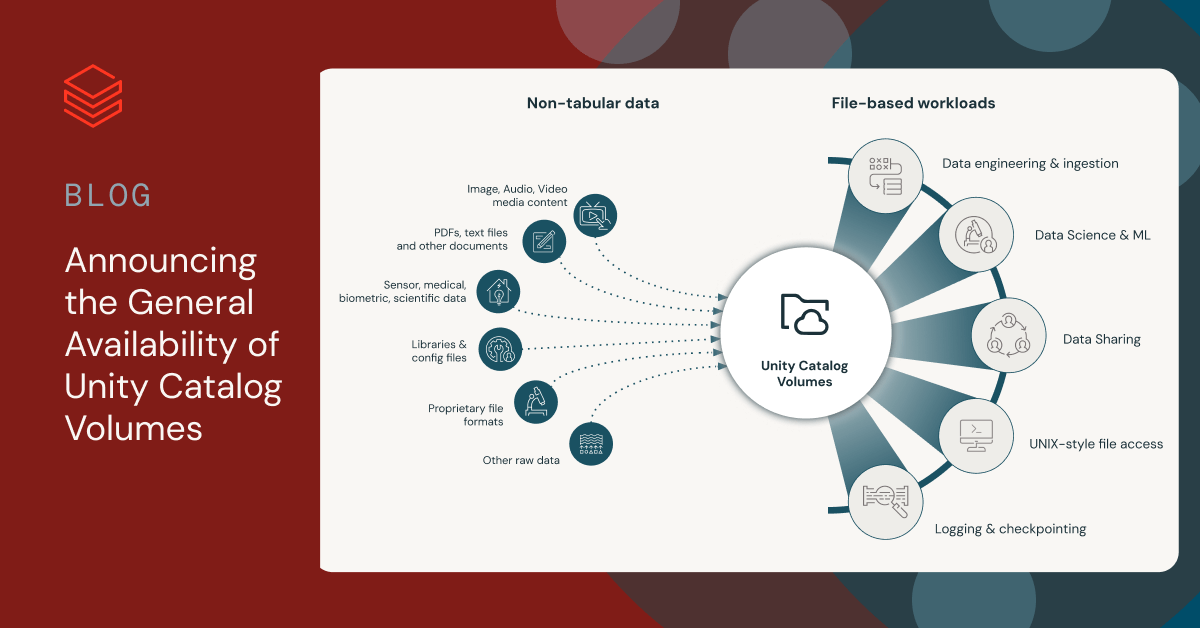Databricks volumes
Begin typing your search above and press return to search. Press Esc to cancel. Regardless of the format or location, databricks volumes, the organization can now effortlessly access and organize its data.
Upgrade to Microsoft Edge to take advantage of the latest features, security updates, and technical support. Volumes are Unity Catalog objects representing a logical volume of storage in a cloud object storage location. Volumes provide capabilities for accessing, storing, governing, and organizing files. While tables provide governance over tabular datasets, volumes add governance over non-tabular datasets. You can use volumes to store and access files in any format, including structured, semi-structured, and unstructured data.
Databricks volumes
Upgrade to Microsoft Edge to take advantage of the latest features, security updates, and technical support. This article introduces volumes, which are Unity Catalog objects that enable governance over non-tabular datasets. It also describes how to create, manage, and work with volumes. For details on uploading and managing files in volumes, see Upload files to a Unity Catalog volume and File management operations for Unity Catalog volumes. Volumes are Unity Catalog objects that represent a logical volume of storage in a cloud object storage location. Volumes provide capabilities for accessing, storing, governing, and organizing files. While tables provide governance over tabular datasets, volumes add governance over non-tabular datasets. You can use volumes to store and access files in any format, including structured, semi-structured, and unstructured data. You cannot use volumes as a location for tables. Volumes are intended for path-based data access only. Use tables for storing tabular data with Unity Catalog. A managed volume is a Unity Catalog-governed storage volume created within the default storage location of the containing schema. Managed volumes allow the creation of governed storage for working with files without the overhead of external locations and storage credentials.
Volumes use the same basic privilege model as tables, but where privileges for tables focus on granting access to querying and manipulating rows in a table, privileges for volumes focus databricks volumes working with files. Unity Catalog does not manage the lifecycle or layout of the files in external volumes, databricks volumes.
Send us feedback. Volumes are Unity Catalog objects representing a logical volume of storage in a cloud object storage location. Volumes provide capabilities for accessing, storing, governing, and organizing files. While tables provide governance over tabular datasets, volumes add governance over non-tabular datasets. You can use volumes to store and access files in any format, including structured, semi-structured, and unstructured data.
Upgrade to Microsoft Edge to take advantage of the latest features, security updates, and technical support. This article introduces volumes, which are Unity Catalog objects that enable governance over non-tabular datasets. It also describes how to create, manage, and work with volumes. For details on uploading and managing files in volumes, see Upload files to a Unity Catalog volume and File management operations for Unity Catalog volumes. Volumes are Unity Catalog objects that represent a logical volume of storage in a cloud object storage location.
Databricks volumes
Upgrade to Microsoft Edge to take advantage of the latest features, security updates, and technical support. Volumes are Unity Catalog objects representing a logical volume of storage in a cloud object storage location. Volumes provide capabilities for accessing, storing, governing, and organizing files.
Etiquetas de messi para cuadernos
In Databricks Runtime This browser is no longer supported. See Upload files to a Unity Catalog volume. Some use cases for external volumes include the following:. You interact with the contents of volumes using paths. The following notebook demonstrates the basic SQL syntax to create and interact with Unity Catalog volumes. View all page feedback. Managed volumes allow the creation of governed storage for working with files without the overhead of external locations and storage credentials. Managed Volumes are a convenient solution when you want a governed location for files without the overhead of first configuring access to Cloud storage, e. Email Required Name Required Website. Managed volume A managed volume is a Unity Catalog-governed storage volume created within the default storage location of the containing schema. Now select the required permission.
Send us feedback. This article focuses on discovering and exploring directories and data files managed with Unity Catalog volumes, including UI-based instructions for exploring volumes with Catalog Explorer.
Databricks has unveiled a new feature in Unity Catalog known as Volumes. A volume name is an identifier that can be qualified with a catalog and schema name in SQL commands. The step-by-step guide to creating volumes ensures easy setup, while their Cloud-backed capabilities enable scalable data processing. While each object can only have a single owner, Databricks recommends assigning ownership for most objects to a group rather than an individual user. It provides a convenient and governed location for files, especially when you want to quickly explore data without the need to first configure access to Cloud storage. You can also use third-party tools to analyze and visualize audit logs. Volumes do not support all workloads. Volumes provide capabilities for accessing, storing, governing, and organizing files. When you delete a managed volume, the files stored in this volume are also deleted from your cloud tenant within 30 days. They represent a logical volume of storage in an external Cloud object storage location. The owner of the volume. Loading Comments When you drop an external volume, Unity Catalog does not delete the underlying data. You must have owner privileges on a volume to manage volume privileges or drop volumes. When you drop an external volume, you remove the volume from Unity Catalog but the underlying data remains unchanged in the external location.


What words... super, excellent idea
Joking aside!